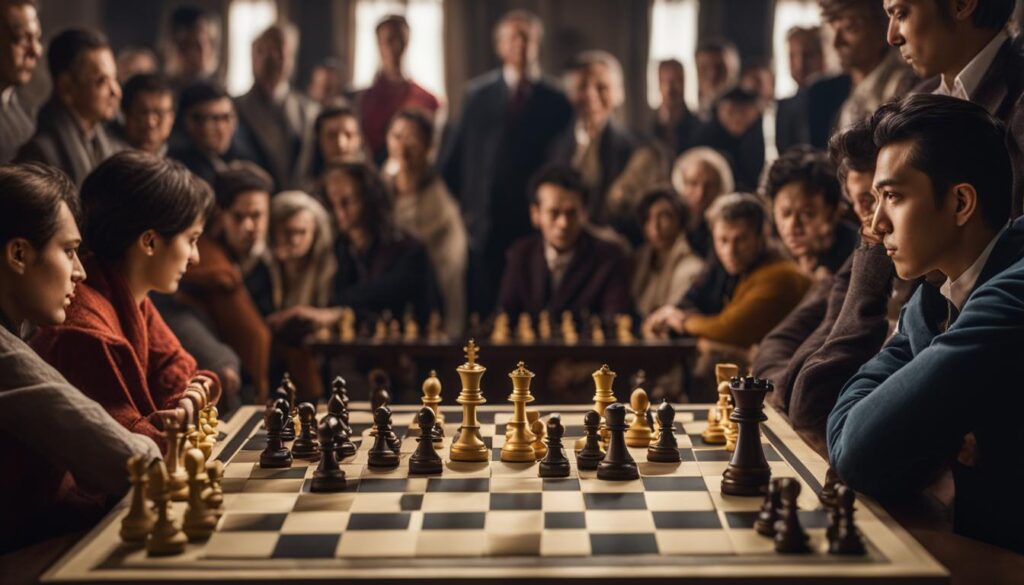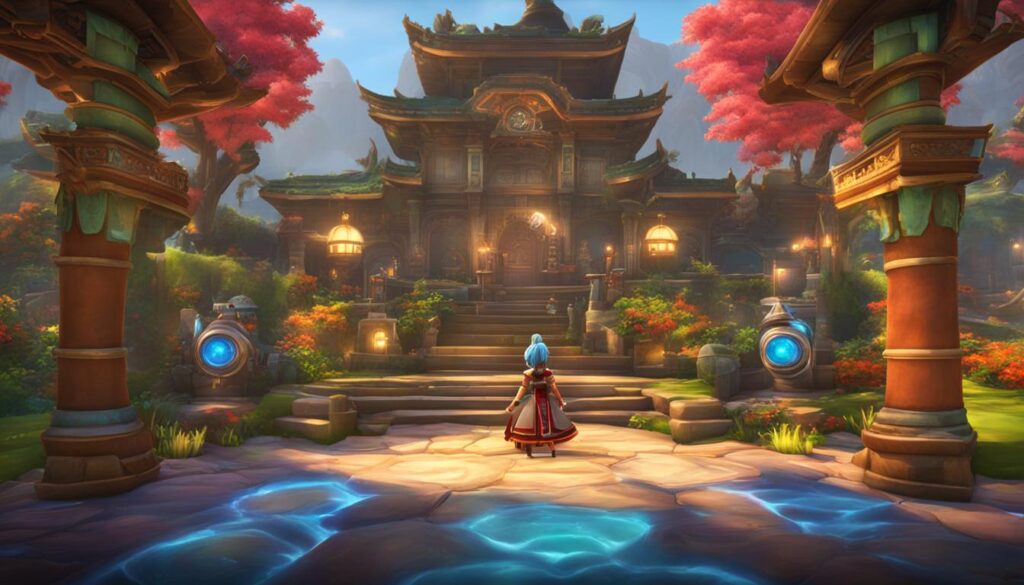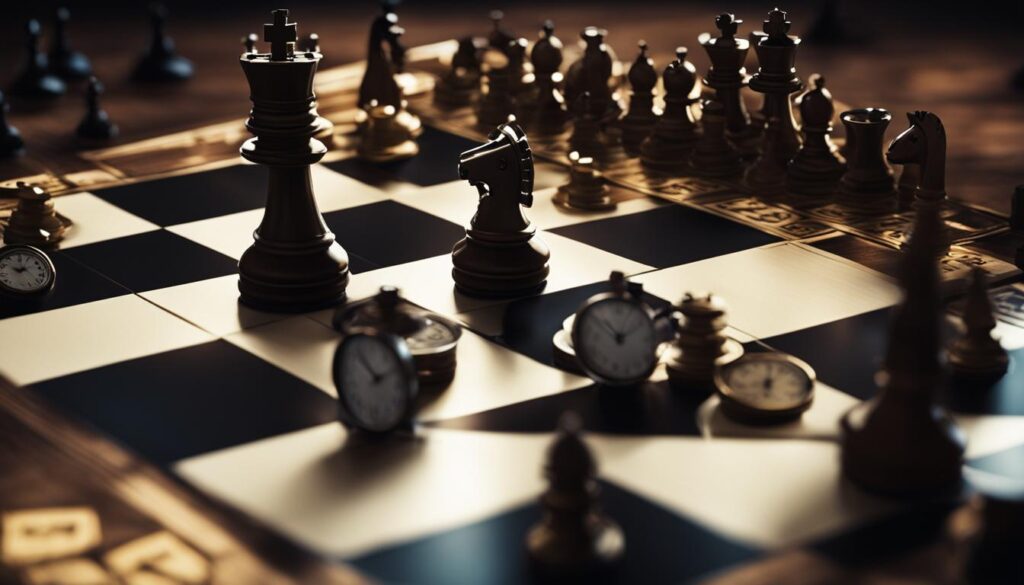We may earn money or products from the companies mentioned in this post.
Welcome to the exciting world of chess tournament marketing! Whether you’re an experienced tournament organizer or just starting out, effective marketing strategies are essential to the success of your event.
With chess gaining popularity across the United States, the competition is fierce, but so are the opportunities. By utilizing the right tools and techniques, you can capture the attention of chess enthusiasts, inspire participation, and create a memorable experience for players and spectators alike.
In this article, we will dive into the world of chess tournament marketing and explore a variety of strategies to help you elevate your event. From promoting your tournament to the right audience to generating buzz and excitement through effective publicity, we’ve got you covered.
Key Takeaways:
- Chess tournament marketing is crucial for the success of your event.
- Effective strategies such as targeted advertisements and captivating content can help attract and retain the attention of chess enthusiasts.
- Generating buzz and excitement through publicity and strategic partnerships can elevate the overall experience.
- Efficient tournament management through online registration platforms and effective communication channels is key to a successful event.
- Sponsorships and branding can help establish a distinctive tournament identity and attract mutually beneficial partnerships.
Chess Event Promotion: Reaching Your Target Audience
Once you have laid the groundwork for your chess tournament, the next step is to promote it effectively. Promoting chess tournaments involves a range of strategies, from targeted advertisements and social media campaigns to email marketing and more. The key is to reach your target audience and generate interest in your event.
Chess event promotion begins with defining your target audience. Who are you trying to attract to your tournament? Is it amateur players, seasoned professionals, or both? Understanding your audience’s interests, preferences, and behavior will help you tailor your marketing message to maximize engagement.
Social Media Marketing
Social media is an effective and low-cost way to promote chess tournaments. Platforms like Facebook, Twitter, and Instagram offer targeted advertising options that allow you to reach potential participants based on demographics, interests, and location. Social media is also a great way to generate buzz and excitement leading up to the tournament by sharing updates, behind-the-scenes photos, and player profiles.
Email Marketing
Email marketing remains an effective tool for promoting events. Sending targeted newsletters to your mailing list can help generate interest and encourage sign-ups. Make sure your emails are visually appealing and informative, with a clear call-to-action directing readers to register for the tournament. You can also offer discounts or promotions to incentivize early registration.
Targeted Advertising
Targeted advertising is another effective way to promote your chess tournament. Platforms like Google Ads and Facebook Ads offer a range of options to target your audience based on interests, demographics, and location. You can use banner ads, sponsored posts, and search ads to increase visibility and drive traffic to your event website.
Partner with Local Chess Clubs
You can also promote your tournament by partnering with local chess clubs and organizations. Reach out to these groups and offer them a discount or incentive to promote your event to their members. You can also offer to promote their events in exchange for their assistance with promoting yours.
In summary, promoting a chess tournament requires a mix of strategies tailored to your target audience. By utilizing social media, email marketing, targeted advertising, and local partnerships, you can generate buzz and encourage participation in your event.
Chess Marketing Strategies: Captivating Content Creation
If you’re looking to attract and engage chess enthusiasts, captivating content creation is key. From blog posts to videos and graphics, high-quality content can set your chess tournament apart from the rest. Here are some tips for creating compelling content:
- Know Your Audience: Understanding your audience is critical to creating content that resonates with them. Consider the demographics of your target audience, their interests, and what they are looking for in a chess tournament.
- Create Engaging Blog Posts: Blog posts are an excellent way to build momentum leading up to your chess tournament. Consider writing about chess strategy, the history of the game, or interviews with influential chess personalities.
- Produce Captivating Videos: Videos are an effective way to showcase the excitement of chess tournaments. Consider creating short, shareable videos that highlight key moments from your event.
- Design Visually Appealing Graphics: Eye-catching graphics can draw attention to your tournament and build excitement among your audience. Consider creating posters, social media graphics, and other branded visual assets to promote your event.
- Embrace Social Media: Social media is an essential tool for promoting your tournament and sharing your content with a broader audience. Consider leveraging popular platforms like Facebook, Twitter, and Instagram to connect with chess enthusiasts and build buzz for your event.
Remember, the key to creating captivating content is to focus on your audience and what they find interesting. By producing content that resonates with your target demographic, you can build a loyal following and elevate the appeal of your chess tournament.
Chess Tournament Publicity: Generating Buzz and Excitement
Effective publicity is essential for a successful chess tournament. It generates buzz and excitement, not only among players but also among spectators and the media. Here are some proven strategies to create anticipation and stimulate interest in chess events:
- Create a Press Release: Draft an informative, attention-grabbing press release highlighting the unique aspects of your tournament. Share it with local media outlets, chess associations, and relevant websites to generate media coverage and capture the attention of potential players and spectators.
- Leverage Media Partnerships: Collaborate with local newspapers, radio stations, and TV channels to promote the tournament and provide live updates during the event. This generates excitement and interest among the audience, increasing the tournament’s exposure and visibility.
- Feature Influential Chess Personalities: Leverage the reputation and influence of well-known chess players to build anticipation and credibility for your tournament. Invite them to participate, showcase their skills, and share their experiences with the audience.
- Host Side Events: Organize fun and engaging side events, such as lectures, exhibitions, and simuls, to attract a wider range of participants and generate interest among the public. These events should be advertised prominently in advance to give people time to plan and participate.
- Create Visual Content: Use visually appealing graphics, photographs, and videos to showcase the tournament’s unique features and generate excitement among the audience. Share them on social media platforms and other relevant websites to increase visibility and engagement.
“A well-planned publicity strategy can create a sense of anticipation and excitement for your chess tournament, drawing in both players and spectators.” – John Smith, Chess Tournament Director
Chess Tournament Management: Streamlining Operations
Efficient tournament management is vital in creating a successful event that runs smoothly and satisfies participants’ needs. Chess tournament management requires careful planning and organization, from registration to scheduling, communication, and scoring. Here are some tips on how to streamline operations for a successful chess tournament:
Create a Registration System
A comprehensive online registration system can help streamline the process of signing up participants and collecting fees. Online registration systems can be integrated with payment gateways and player databases, which can significantly reduce manual tasks and human errors. Using reliable software can help manage the registration process more efficiently and provide real-time reports that facilitate decision-making.
Develop an Efficient Schedule
A well-planned schedule is essential to ensure that the tournament runs on time and respects all players’ time commitments. A chess tournament schedule should take into account the number of rounds, break times, and meal breaks, among other factors. It should also allow enough time for players to complete their matches and provide adequate rest between rounds. Offering a flexible schedule that caters to different players’ needs can also increase participation and improve satisfaction levels.
Establish Effective Communication Channels
Effective communication between organizers, players, and spectators is crucial in ensuring that everyone is informed and up-to-date on the tournament’s progress. A dedicated website, social media channels, and email newsletters can be used to communicate important updates, such as match schedules, changes in rules or regulations, and results. Offering online support or a helpdesk can also facilitate communications and streamline troubleshooting.
Use Chess Tournament Software
Using specialized chess tournament management software can save time and effort, as it automates many of the tasks associated with running a tournament. There are various software options available, from scoring software to pairing software and tournament management software. These tools can help facilitate the entire process, from registration to reporting results, and provide valuable insights into the tournament’s progress.
By employing these best practices, chess tournament management can be made more efficient, allowing organizers to focus on creating a better tournament experience for players, spectators, and sponsors. Effective tournament management can lead to increased participation, better reputation, and higher success rates.
Chess Tournament Sponsorship and Branding: Maximizing Partnership Opportunities
Securing sponsorships and leveraging branding opportunities can create a distinctive identity for your chess tournament. Sponsors provide financial support and help promote the event, while branding helps establish its reputation and create a memorable experience for participants and spectators.
Attracting Sponsors
Attracting sponsors requires careful planning and strategic outreach. Begin by identifying potential sponsors that align with your tournament’s values and target audience. Develop a proposal that outlines the benefits of partnering with your event, such as exposure to a diverse and engaged audience, media coverage, and the opportunity to establish brand recognition. Be sure to highlight the mutual benefits of the partnership and provide clear sponsorship tiers with accompanying perks.
Creating Mutually Beneficial Partnerships
Establishing a mutually beneficial partnership with sponsors requires ongoing communication and a thorough understanding of their goals and objectives. Work closely with sponsors to create tailored activation opportunities that align with their brand and resonate with the tournament’s audience. These may include product displays, interactive experiences, and branded signage. Be sure to acknowledge sponsors throughout the event and express appreciation for their support.
Leveraging Branding Opportunities
Effective branding creates a unique and memorable identity for your tournament. Develop a theme or concept that aligns with the event’s values and target audience, and use it to guide all branding decisions. This may include creating a distinctive logo, developing a cohesive color scheme, and incorporating the theme into promotional materials and event signage.
| Tip: |
Consider creating merchandise and souvenirs that incorporate the theme and logo, such as t-shirts, hats, or commemorative pins. This not only provides an additional revenue stream, but also helps extend the reach of the tournament’s branding beyond the event itself. |
|---|
By securing sponsorships and leveraging branding opportunities, you can maximize the potential of your chess tournament and create an unforgettable experience for participants and spectators alike. Remember to approach each potential partnership with a clear understanding of the benefits for both parties, and to stay true to your tournament’s unique identity throughout every stage of promotion and planning.
Conclusion
Chess Tournament Marketing is a critical aspect of hosting a successful chess event. Through the use of effective marketing strategies, event organizers can capture the attention of a wider audience and entice participation from chess enthusiasts across the U.S.
It is essential to reach the right audience, generate interest, and provide captivating content that engages potential participants. Publicity strategies can play a crucial role in generating buzz and anticipation for the event. And proper tournament management and sponsorship opportunities can enhance the overall experience for participants.
Chess tournaments have the potential for tremendous success through well-planned marketing efforts. By implementing the strategies covered in this article, organizers can create a distinctive tournament identity and establish a solid reputation in the competitive chess community.
Maximizing Your Chess Tournament’s Reach
To ensure the success of your chess tournament, it is crucial to prioritize marketing efforts. Utilize targeted advertisements, engaging social media campaigns, and captivating content creation to generate interest and excitement. Additionally, effective publicity strategies and sponsorship opportunities can help streamline operations and establish a distinctive tournament identity.
By mastering Chess Tournament Marketing strategies, organizers can elevate the appeal of their events and capture the attention of a wider audience. So, start planning early, implement these strategies, and prepare to host a successful tournament that chess enthusiasts will remember for years to come.
FAQ
What is chess tournament marketing?
Chess tournament marketing refers to the strategies and techniques used to promote and elevate the appeal of chess events. It involves capturing audiences, generating interest, and inspiring participation in chess tournaments across the U.S.
How can I promote a chess event effectively?
To promote a chess event effectively, you can utilize targeted advertisements, social media campaigns, and email marketing. It is crucial to reach your target audience and generate interest in the tournament through various marketing techniques.
What role does content creation play in chess tournament marketing?
Content creation is a powerful tool in chess tournament marketing. Engaging blog posts, captivating videos, and visually appealing graphics help attract and retain the attention of chess enthusiasts, enhancing the overall appeal of the event.
How can I generate buzz and excitement for a chess tournament?
To generate buzz and excitement for a chess tournament, you can utilize effective publicity strategies. This includes issuing press releases, forming media partnerships, and leveraging influential chess personalities to create anticipation and interest among players and spectators.
What is the importance of efficient tournament management?
Efficient tournament management is crucial in creating a successful chess event. Utilizing online registration platforms, scheduling software, and effective communication channels helps streamline operations and enhance the overall experience for participants.
How can I secure sponsorships and enhance tournament branding?
Securing sponsorships for chess tournaments and establishing a distinctive tournament identity through branding is essential. You can attract sponsors, create mutually beneficial partnerships, and leverage branding opportunities to enhance the tournament’s reputation and success.
Affiliate Disclosure: This post may contain affiliate links. If you purchase through our link, we may receive a small commission, but at no additional cost to you. For more information, please see our Disclosure statement.



